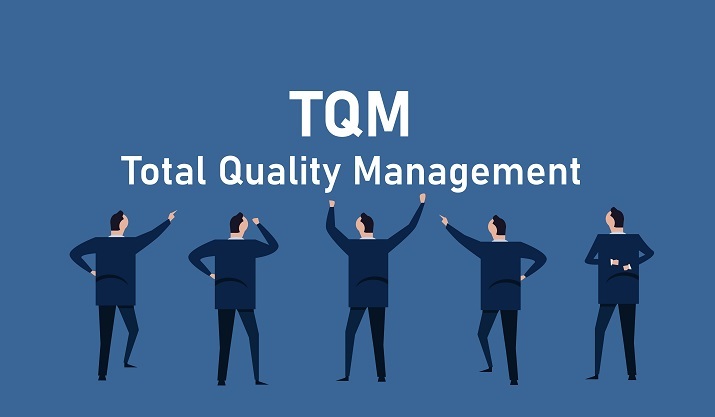
 Data Structure
Data Structure Networking
Networking RDBMS
RDBMS Operating System
Operating System Java
Java MS Excel
MS Excel iOS
iOS HTML
HTML CSS
CSS Android
Android Python
Python C Programming
C Programming C++
C++ C#
C# MongoDB
MongoDB MySQL
MySQL Javascript
Javascript PHP
PHP
- Selected Reading
- UPSC IAS Exams Notes
- Developer's Best Practices
- Questions and Answers
- Effective Resume Writing
- HR Interview Questions
- Computer Glossary
- Who is Who
The Impact of Total Quality Management on Organizational Culture and Employee Morale
Introduction
In a company, ensuring the quality of the product and services offered to a client is paramount. To provide it, all departments of the firm, be it engineering, marketing, sales, and design must work together to ensure clients' complete satisfaction. Here TQM ensures product and service quality at every stage. While aiming for high?quality products and services, you must raise employee morale and keep them engaged. Contrary to popular opinion, TQM protocols can improve employee morale and organizational culture.

How is TQM Effective in Improving Employee Morale?
The key purpose of implementing Total Quality Management across all departments of a company is to reduce wastage and chances of rework. It ensures that the product your company develops, or the service your company provides is evaluated and undergoes thorough quality assurance procedures at each phase. This way the final product will be defect?free. When a product is sent for rework, it may lead to degradation of the employees' morale. If your client accepts the final product with positive feedback, it can be helpful for your employees and provide them with the needed boost.
Hence, with the TQM protocol, you create the basic framework for your employees to improve their efficiency and productivity. Some of the other ways that TQM can boost the morale of your employees are:
-
Involving your employees in business processes: When you try boosting the morale of your employees, it is essential to apply them in the business processes. They must feel included in the business operations and decisions. Surveys show employees feel included in business decisions, making running projects easier and identifying potential risks.
As your employees are at the forefront of running the operations, they are the best people to help you identify a project's dependencies. Hence, by including your employees in the business processes and decisions, you can streamline the entire process, improve employee morale, and increase your company's overall productivity.
-
Integrating the disparate teams: In your company, several teams must work on different projects and run several business operations. Nevertheless, it is essential to ensure that there are clear lines of communication among your employees. Failing to integrate your teams, especially the disparate ones, the overall productivity of your firm can reduce significantly.
Moreover, it can affect the morale of the other employees as they are unaware of the functioning of the other teams, yet they are dependent on them. Thus, by implementing the TQM protocols, you can create a cohesive structure where you develop clear lines of communication among your teams. Better communication among your units will ensure they remain on the same page when working on the same or different projects. This will help integrate your teams and boost their morale.
-
Improves your approach to employee requirements: As a business manager, you must evaluate your requirements, and the TQM protocols will help you. It provides a systematic and strategic approach to any problem with an ongoing project.
For example, you feel that a specific team is not performing at par, and all it needs is a certain level of training to provide it with the same level of efficiency as the other teams. When you have the TQM protocols, you have actionable information and can strategically approach your employees' requirements. This will help boost the morale and productivity of your employees. It also showcases the fact that you are interested in the career of your employees.
Thus, TQM can go a long way in helping your employees improve their performance. It will help them interact better with clients, understand customer requirements, and encourage collaboration. For the executive body, you must retain your employees as they are essential for your company's growth. Hence, if you have a quality management system, you will know the support you need to give your employees to improve their productivity and boost their morale.
Can TQM Prove to Help Improve Organizational Culture?
If you are a company that works with cross?cultural teams, TQM can help create a cohesive environment. A cross?cultural work environment always requires absolute clear lines of communication, without any room for misinterpretation, and respect for every culture (and religion) of the teammates.
Here, it would help if you had suitable quality assurance protocols to help you communicate easily with these teams and get regular updates regarding the project's progress. When you hold meetings, you should do it in a way that there is no chance of hurting the sentiments of the foreign team. With the proper TQM system, you will have all the necessary information on a single platform, making it easy to collaborate and encourage knowledge transfer across teams.
When you have TQM protocols in place, you encourage and expect your employees to take ownership of the products and services that are provided to clients; this is vital to promote organizational culture. Your employees must feel that they are contributing to the business organization and their contribution is valuable. In the corporate culture, TQM protocols allow the testing of products, databased analysis, and information sharing so that employees can have better understanding of the products and services offered by the company. Thereby, in the long run, it can help create a better work environment.
Conclusion
In this way, the impact of TQM on organizational culture and employee morale helps in evaluating the employee requirements. If necessary, you can provide them with the training needed to improve the modes of communication or make additional changes to provide them with a better work environment. This will help boost employee morale and enhance productivity.

